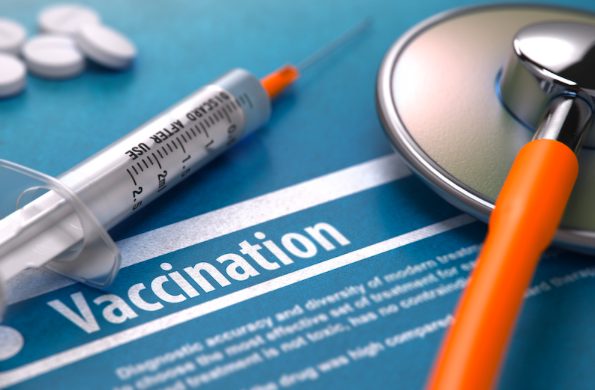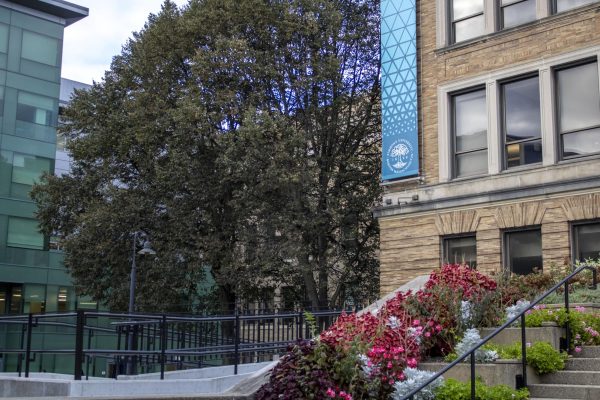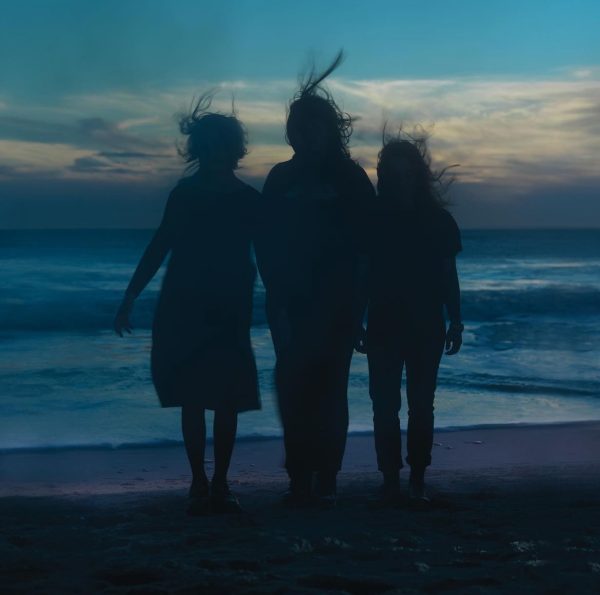What Anti-Vaxxers Won’t Tell You

Image Source: Caswell Medical
March 23, 2019
As I step off the train at South Station, I’m greeted by two dark-haired, blue-eyed men towering over me. One standing solemnly, the other beaming, snapping and tapping his feet so much I wonder to myself how he’s managing to stand still at all. As I greet my father and my older brother, Jake, we start walking toward the silver line. The energy and excitement from Jake is not only apparent on his face, but you can feel it within you just being in his presence.
“I’m going to a concert with my sissy!” Jake exclaims for the tenth time this week. For Christmas, I told Jake I was taking him to a concert of his choice – attending a concert being something my older brother had never done before, despite music running through him like blood all hours of the day. He chose Modest Mouse, understanding he had to wait until the heat of July came before the day rolled around.
As we walked, his nerves and excitement continued bubbling up inside; he paced and walked, sometimes running ahead of my father and I, even skipping for a few steps. When we arrived at the gate and entered into Blue Hills Bank Pavilion, the sun was just starting to set and I found myself half-running to catch up with Jake as he headed to buy a t-shirt and a vinyl album to add to his collection. His pacing continued, and now he was snapping and smiling to himself, unable to contain his excitement over seeing his first concert.
Jake has autism, but he didn’t get it from a vaccine.
You are probably aware of the vaccine debate that has appeared in more recent years. While “few measures in public health can compare with the impact of vaccines,” few life-changing scientific developments have this much of a bad reputation. Vaccines have become a heated conversation with two distinct sides flooding social media and even becoming part of everyday conversation. Myths of a falsified link between autism and vaccines have become the forefront of uninformed Facebook posts and arguments. While everyone seems to have unchanging opinions on the topic, few have done adequate research. Every child who can be vaccinated, should be vaccinated – not only to protect the child themselves, but to protect everyone around them.
Most people know there’s an alleged link between autism and vaccines. But how did this become a widely-accepted myth? In 1998, this idea was introduced through a paper published by Dr. Andrew Wakefield. Wakefield’s license was later revoked after his work was proven to be intentionally falsified and considered “elaborate fraud.” While his study was false, he continues to spread the inaccurate message to the uninformed – and easily persuaded – general public, most recently through a popular documentary titled “Vaxxed.” This documentary was not only directed by Wakefield (the same man who published the falsified study), but he also appears as the main expert in the film. William Thompson, a scientist working with the CDC, is heavily portrayed in the film but never seen on camera; only his voice is heard. Why? Thompson’s phone calls, unrelated to Wakefield and his mission, were secretly recorded and used to support Wakefield, building false ethos for his argument.
In addition to all the talk over a false link between autism and vaccines, there is conversation regarding rising rates of autism in the United States. This has gained publicity due to Donald Trump’s comments on autism becoming an epidemic and while there is data to support rising statistics, it has nothing to do with vaccinations. Over the years, there has been evolving dialogue on how autism is defined, what qualifies as autism, as well as an increase in general awareness leading to more understanding and therefore, diagnoses. There are higher rates on paper (about one in 45, or just over two percent), but this is due to changing criteria for diagnosis, not because of life-saving vaccines.
Two siblings, two parents, two years apart. Identical vaccine schedules – but Jake has autism, and I don’t. If vaccines caused autism, wouldn’t I be autistic, too? Although Jake wasn’t diagnosed until a later age (refer to the previous paragraph on changing criteria for diagnosis), my mom knew from the time Jake was born that something was different. Doctors reassured her that everything was fine. But when I was born, it solidified what my mom had already known: Jake was different.
Statistically, the power of vaccinations is almost incomprehensible. Since the 20th century, every disease with a vaccine has been reduced by at least 90%, while many have achieved reductions of up to 99%. Diseases that used to kill, are close to extinction. Vaccines lack rivals in terms of public health, but in order to be effective, communities need high rates of vaccination. This is called “community protection” or “herd immunity.” It requires everyone to be vaccinated, in order to protect those who are highly susceptible, and cannot be vaccinated (i.e. very young babies, pregnancy, allergies, or those undergoing radiation or chemotherapy). While vaccinating your children protects their lives, it is also vital to public health as it protects those who can’t receive the same life-saving vaccinations.
Recently, there have been outbreaks of diseases otherwise almost eliminated from communities. As you’ve probably seen in the news, particularly publicized is an outbreak in Washington state. As of the end of January, Clark County – a county with one of the lowest vaccination rates in Washington, with about 8% of public school students exempt from vaccinations, had seen 36 confirmed and 12 suspected cases of measles. This is a case where herd immunity is not achieved, leading to this outbreak – despite the measles vaccine being 97% effective. This leads to immense danger, particularly for those who are unable to be vaccinated and have to rely on others to protect them from deadly diseases. Dr. Douglas J. Opel, of Seattle Children’s Hospital, says “Any time we have an outbreak of a disease that we have a safe and effective vaccine against, it should raise a red flag.”
The myth between autism and vaccines has been debunked in countless studies. Most recently, research was conducted by the Cochrane review. 15 million children took part in this research, consisting of “six self-controlled case series studies, two ecological studies, one case crossover trial, five time series trials, 17 case-control studies, 27 cohort studies and five randomized controlled trials,” and no evidence of a link was found. This large-scale study proves that even when a link is being sought after, nothing can be detected; there is no link between autism and vaccines.
“Jake,” I say, breathing in the air around me, “Do you know what that smell is?”
“What?” he turns around and looks at me intently, inhaling the same air.
“Weed.”
He looks at me even more intently, even more anxiety and excitement bubbling up in him, “No way, Annie! It is?”
I nod; his face overtaken with disbelief that people are smoking weed, something he has never even smelled before at 18 years old. While he looks around and takes in this new smell and realization, he checks the corners of his vinyl album, feeling them for even the slightest bend or distress. Looking down and flattening out his new t-shirt, examining this second souvenir for any miniscule sign of imperfection, he asks me to take a picture of him, so he can always remember his first concert. Four years later, Jake has just as much innocence and wonder as he did at his first concert.
Everyone who can be vaccinated, needs to be vaccinated. Refusing to vaccinate your children is inconsiderate to the health of your children and to public health, and doing so for fear of autism is dehumanizing to individuals with autism. When we have the technology to safely eliminate deadly diseases, why would we choose to forgo these vaccines?
Vaccines do not cause autism.
Ingrained in me since this night is a question I have for anyone who chooses not to vaccinate their children due to irrational fear of autism: how could one possibly prefer watching their child die, over experiencing life with someone who saw everything so differently, so innocently, and so magically?


















Dolphin2121 • Mar 26, 2019 at 11:50 am
Actually… she’s correct in that he directed an anti-vaccine film and was involved in an anti-vaccine paper. According to the US National Library of Medicine National Institutes of Health, “In 1998, Andrew Wakefield and 12 of his colleagues[1] published a case series in the Lancet, which suggested that the measles, mumps, and rubella (MMR) vaccine may predispose to behavioral regression and pervasive developmental disorder in children. Despite the small sample size (n=12), the uncontrolled design, and the speculative nature of the conclusions, the paper received wide publicity, and MMR vaccination rates began to drop because parents were concerned about the risk of autism after vaccination.”
Goldy • Mar 24, 2019 at 1:03 am
Dr Wakefield was not anti vaccine and in fact advocated for vaccination against measles. Wakefield’s 1998 Lancet study was coauthored by 12 other scientists and b) the paper made no such conclusion whatsoever between MMR and autism. it was a case series study of a novel gastrointestinal condition. He recommended giving separate measles, mumps and rubella vaccines instead of the MMR shot until conclusive studies had been undertaken on the combined MMR vaccine. Strangely right after his recommendation the UK made individual vaccines unavailable. Blaming Wakefield for a reduced uptake is ridiculous.
He simply took the doctors referrals, treated the disease and reported the information provided by the parents which is that their children’s autistic symptoms began shortly after they were given the MMR vaccine. Also, his 19 other papers were never retracted, and the investigations into gastrointestinal disease has been replicated multiple times around the world.
It is of interest that the person that retracted the study, Sir Crispin Davis, was making a large salary in a non-executive director position on the board of UK MMR makers GlaxoSmithKline. The “investigation” was funded by The Sunday Times whose owner at the time, Rupert Murdoch’s son James, was making a large salary in his director position on the board of UK MMR makers GlaxoSmithKline. In the 1998 press conference Dr Walker Smith worked in the same capacity as Wakefield and was exonerated. Dr Wakefield did not have insurance to cover his legal fees.
Justice John Mitting, in Case No: CO/7039/2010 in the Royal Courts of Justice Strand, London, ruled on the appeal by Walker-Smith, saying that the GMC “panel’s determination cannot stand. I therefore quash it.” He said that its conclusions were based on “inadequate and superficial reasoning and, in a number of instances, a wrong conclusion.”